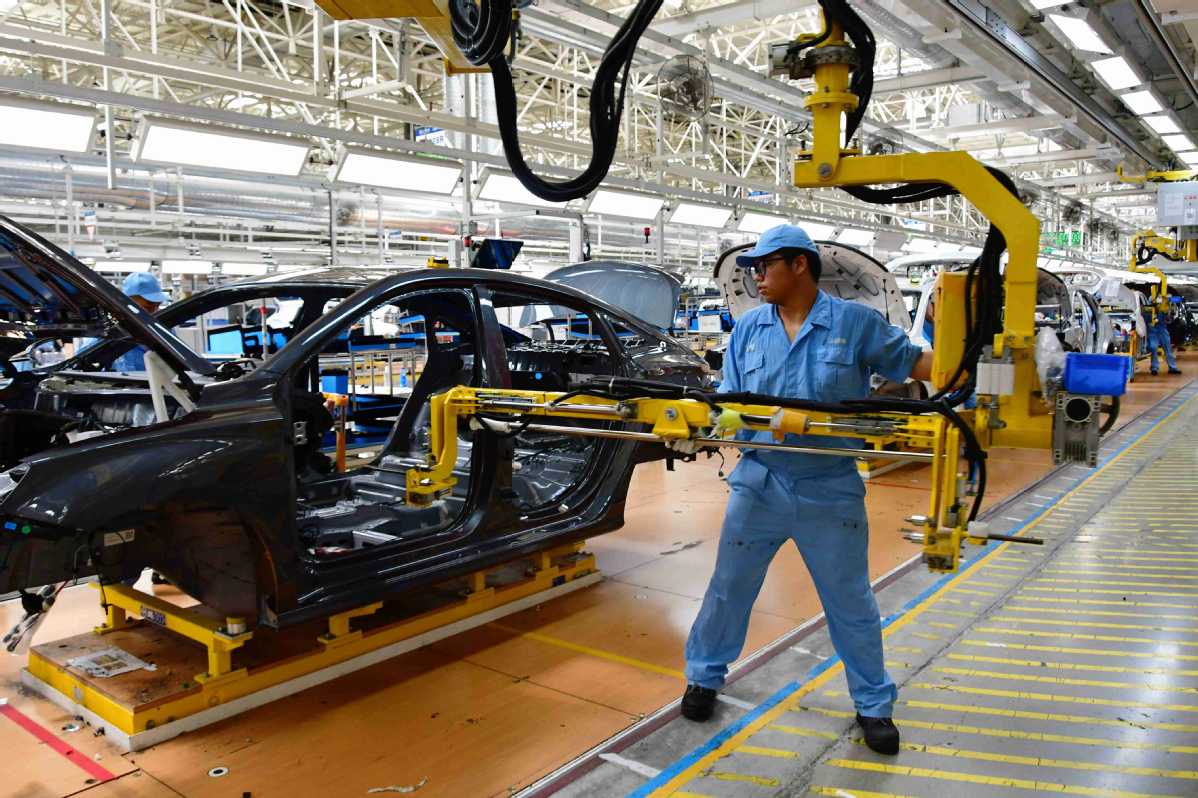Carmakers charge into China partnerships for edge in EVs
By LI FUSHENG | China Daily | Updated: 2022-10-26 09:38

Global manufacturers spending big for expertise in software, electrification
Major foreign automakers are looking to Chinese companies for their expertise in smart electric vehicles as established giants are ramping up efforts to charge into the burgeoning sector.
BMW announced recently that it will purchase newly developed round lithium-ion battery cells from Envision AESC, the battery-making arm of Chinese company Envision Group, for its EVs to be manufactured in the United States.
"The new round cell specially designed for the electrical architecture of our next-generation models will allow us to improve range, driving performance and reduce charging times," said Joachim Post, a BMW board member responsible for its purchasing and supplier network.
Envision AESC is planning to build a dedicated 30 gigawatt-hour battery manufacturing plant in South Carolina, and work is currently underway to finalize a suitable site close to BMW's vehicle production and battery assembly facilities.
This is the third Chinese battery cell maker that BMW has inked deals with in the past 40 days. In early September, the German carmaker unveiled its agreements with Contemporary Amperex Technology Co Ltd and EVE Energy to power new-generation electric models starting in 2025.
The two battery companies will build battery plants in both China and Europe. Their new round cells, which Envision AESC will produce in the US, will enable a major leap for BWM's EVs with regard to energy density, charging speed and range, said the carmaker.
BMW's cumulative EV sales are expected to reach 2 million units by 2025, and EV sales will account for at least half of its global sales by 2030.
CATL has been a supplier to BMW for years. "We look forward to developing and delivering more competitive and sustainable solutions for our partners to promote the global drive for e-mobility and energy transition," said Robin Zeng, founder and chairman of CATL.
BMW is not alone. Volkswagen is spending 2.4 billion euros ($2.35 billion), its largest single investment in China, to develop driving-assist functions with Horizon Robotics for its EVs.
Establishment of a joint venture is underway and is expected to be complete in the first half of 2023, said Volkswagen, adding that its software arm Cariad will hold a 60 percent share in the partnership.
Beijing-based Horizon is one of the major players in China providing computing solutions for smart vehicles, specializing in software, algorithms and chip design.
Ralf Brandstaetter, chairman and CEO of Volkswagen Group China, said China has been the world leader in intelligent and connected vehicles since 2015 and is "always faster than expected".
Brandstaetter attributed China's leading role to factors like the country's clear guidelines, as well as the cooperation between the government, scientific institutions and companies.
"The best possible way to harness this trend of innovation and strengthen our competitive edge is to immerse ourselves in this ecosystem," said Brandstaetter.
Brandstaetter said some weeks ago, he test-drove an electric Volkswagen ID.4 SUV featuring technology that Cariad and Horizon are working on together. "It was an amazing experience," he said.
In terms of electrification, Chinese company Gotion is serving as a pillar of Volkswagen's growth plan.
Volkswagen acquired a 26 percent share in the Anhui-based battery maker in 2020. Last year, it was entrusted with the task of developing the first-generation unified cells for its volume vehicle segment.
Gotion is also tasked with fast-cell industrialization at Volkswagen's Salzgitter plant in Germany as the "technology partner for the cell factory layout, machinery and production processes". Production is expected to start around 2025.
Tesla said on Thursday that its first overseas plant, located in Shanghai, is "supplying vehicles to most markets outside of North America". The plant, as Tesla's major export hub, has an annual production capacity of over 750,000 units.
Tesla said more than 95 percent of the auto parts used in its Shanghai-made vehicles are from China and almost all the employees at the plant are Chinese nationals.
China is emerging as the main source of supplies in the global auto industry primarily, thanks to its first-mover advantage, said Zhang Yongwei, vice-president of China EV 100, a major think tank in the new energy vehicle sector.
Zhang said the rise of local companies along the industrial chain has a lot to do with China's faster pace toward electrification, which started in earnest in 2009 when most countries thought it was too early to develop the sector.
SNE Research shows that six out of the world's top 10 battery makers in the first half were from China.
China EV 100 said carmakers in China launched 33 passenger electric and plug-in hybrid models in the first half, accounting for 60 percent of total newly launched passenger vehicles in the period, bringing the total number of EV model types to around 300 in the country.
























